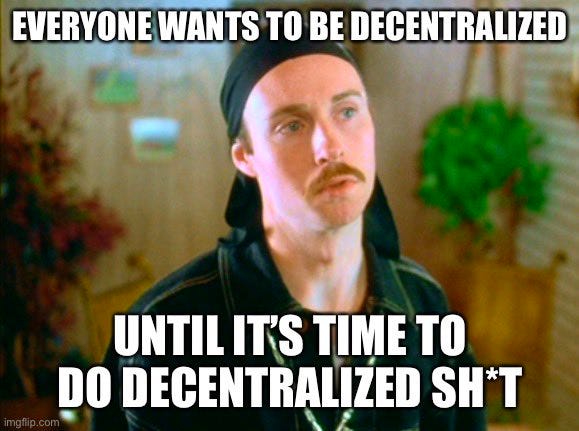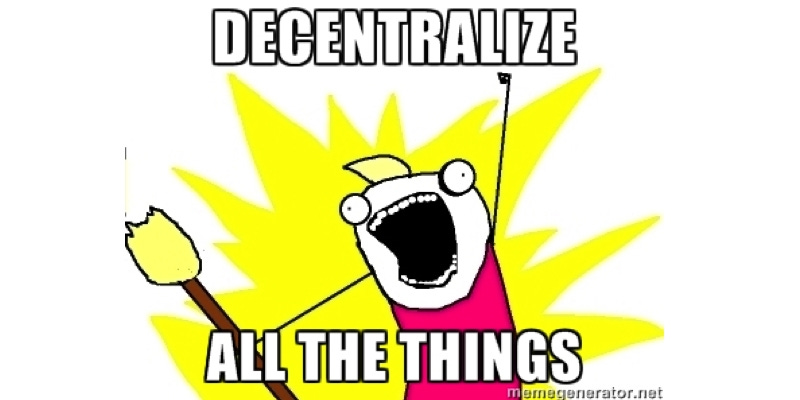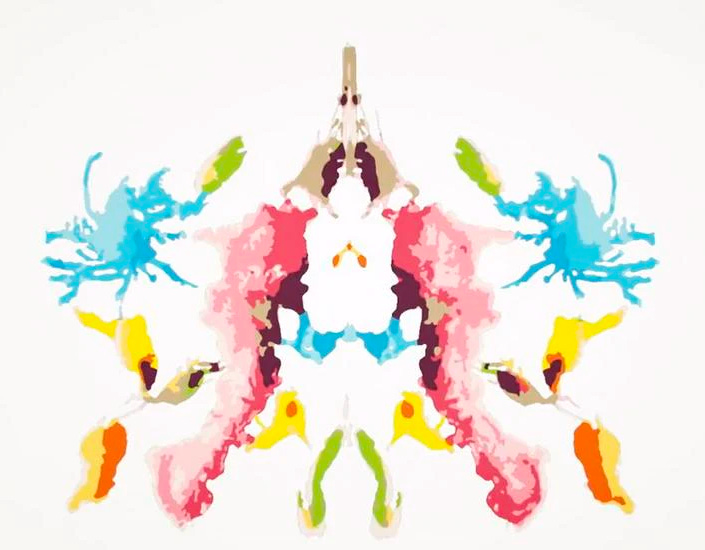What's Next After ‘Decentralization’
Crypto needs new north star ideas to guide development
In this godforsaken industry we love to talk about decentralization. We’re constantly using this word. It’s a fantastic word with descriptive and prescriptive qualities, with the perfect balance of specificity and vagueness. It describes the systems of today and simultaneously describes the systems of the future. It is a rallying cry and a north star.
But I’m here to claim that we have outgrown decentralization. It is not serving us anymore as a concept. It’s loaded now! What began as a word representing the trend towards incorruptible computer systems gradually began informing how we decide what to build. We’ll encounter a policy question, like “what is the best distribution of token equity?” and then turn to this idea of decentralization in spite of its utter uselessness in deciding questions around target gini coefficients.
To make things concrete: decentralization in its original sense was about corruption resistance. Not censorship resistance, corruption resistance. A system that has corruption resistance has these properties:
it is not administrated or controlled by a single entity
anyone can become an administrator, there is no gatekeeper
If we’ve learned anything from the success of crypto thus far we’ve learned that corruption resistance is the bare minimum needed to get people to sign on to collective efforts like a new currency. If I started a crypto currency using a centralized network today, I would have a hard time convincing anyone that I wouldn’t abuse my power later. But when the network is controlled democratically, no individual has that power and everyone can invest more safely.
Why is decentralization not about censorship resistance? Because censorship resistance is a real can of worms. To get censorship resistance we need these computer networks to operate in secret, without an open list of node IPs. When node IPs are public the way they are now, state actors can kick in the door of domestic node operators and blacklist the IPs of foreign node operators.
There are a whole slate of other things that decentralization is not really about.
A geographically distributed computer network? Not decentralized (Google has servers in over 69 countries). A closed network with many actors? Not decentralized (the banking system is thousands of institutions with state gatekeepers). Nope, it’s just about corruption resistance.
I’m not saying that censorship resistance isn’t important. Quite the opposite. I'm doing my best to ring the alarm on the impending collision course between decentralized blockchains and nation-states. But decentralization is not the right concept to lead this charge.
The Decentralization Dogma
At some point the tail began to wag the dog on this word. It got coopted into marketing materials as jargon that signaled ideological purity. It got referenced as a principle to inform complicated design decisions. It got memed into a tribal rallying cry during manic price rallies and into monk-like meditations during depressive bear markets. Crypto was a movement, and the unifying idea seemed to be decentralization.
And the above sentiment seems destined to play out. How can any monopolistic consumer service compete with a decentralized version? Decentralization gives people sovereignty over their data and the system itself. People like that better, naturally. Digital feudalism will end and digital capitalism will replace it. There’s immense value to the simple idea that the world of server technology is changing, and that centralized systems with long terms-of-service operating “on behalf” of users are probably doomed.
But even the mighty decentralization concept has its limits, and we’re starting to see that the concept operates better as a descriptor than a guiding principle, because it offers us little in the exploration of simple questions.
For example: How decentralized should we be? What is the ideal distribution of network power? Across the political spectrum, capitalists and communists might agree that it’s bad when power becomes too concentrated. But if this is all that the concept of decentralization has to offer then it’s probably irrelevant here.
Or another, more sophisticated question: Which is more decentralized, proof of work or proof of stake? Trick question! Neither. When we talk about “proof of XYZ” we’re talking about the coordination mechanism that network participants use to democratically decide what valid blocks look like and who gets to produce them. The XYZ is the resource that’s used for voting in the democratic process, since one-person-one-vote is subject to fraud. In proof of work miners hold direct power and mining pools hold indirect power. In proof of stake tokenholders hold direct power and validators hold indirect power. But neither system is inherently more decentralized by nature.
Where does this leave us? It is my sincere hope that we collectively get really good at distinguishing between decentralized systems and censorship resistant systems, because we have a lot of work to do in the latter. And if this revolution will succeed, it will succeed on the basis of its immunity to nation states.





